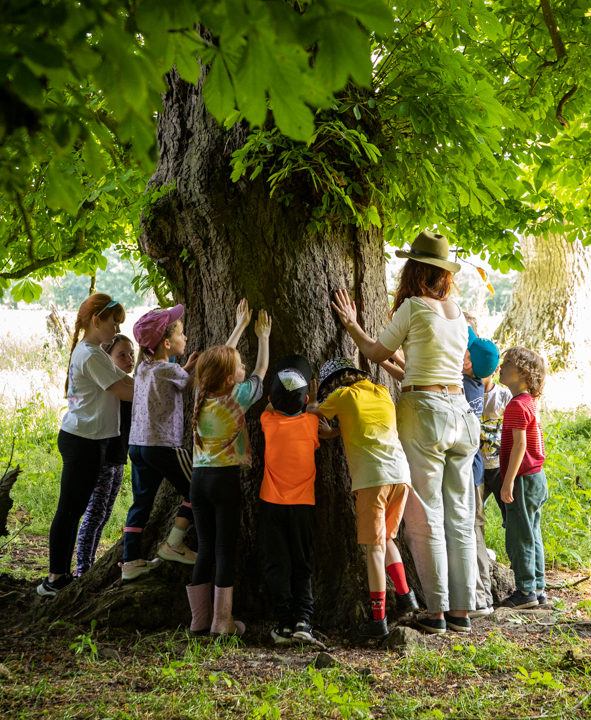
GROWING RESILIENCE
BOOK NOW
NEWS & EVENTS
what is Dúlra?
Dúlra is a Kildare-based educational organisation running outdoor forest school sessions for children, schools and the community.
Dúlra follows the Forest School ethos to provide rich, engaging sessions in wild outdoor settings. Dúlra’s sessions & workshops include Irish folklore and traditions as well as the use of the Irish language. Currently, Dúlra delivers in-school programmes, afterschool clubs, nature walks, community workshops, and holiday camps with primary school children, families and community groups in Kildare, Dublin, Wicklow, Carlow & Kilkenny. Dúlra is a member of the Irish Forest School Association, Forest Schools Association (UK), and Cill Dara le Gaeilge.
Our Forest School activities include:
- Team games & challenges,
- Free play,
- Nature study of local environment (plants and animals),
- Arts & crafts using natural materials,
- Foraging,
- Campfire cooking,
- Bushcraft & shelter building,
- Knots & rope skills,
- Knife & tool work,
- Singing, folklore & storytelling.

What is Forest School?
Forest School is a child-led, play-based outdoor education approach, which came from Scandinavia. Children visit a wild space for regular sessions throughout the year. The sessions are facilitated by trained professionals, and the children explore their space, play games, learn about nature, practice bushcraft and tool skills, and challenge themselves physically. Because the activities are guided by the participants’ abilities and interests, sessions also benefit the whole community; older people, those with special needs and new arrivals to this country.
Regular and long-term sessions at Forest School improve the mental and physical health of participants through time spent outdoors, repeated opportunities to practice resilience, and the building of communities through play, teamwork, fire circles and especially food!
The Benefits
Forest School benefits people in the following ways:
- increasing participants’ nature connection,
- addressing mental health through time spent actively outdoors,
- educating children, communities and families about nature,
- improving health through physical activity,
- building stronger community ties between local children and families who attend Forest School together.
Forest School also helps address the specific needs of minority communities who can be marginalised in society, for example:
- older people, especially those with dementia;
- children, young people and adults with special needs;
- those living with mental health challenges or with neurodivergent minds,
- people for whom language is a barrier,
- people who are new arrivals in Ireland, especially refugees.
Access research on the benefits of Forest School HERE.
To enquire about workshops for your School or Community Group please contact us directly HERE
Learn more about Forest Schools from the Irish Forest School Association.
Dúlra’s Aims/Aidhmeanna an Chláir
To enable children and young people to develop and maintain a strong healthy relationship with themselves, their community and their environment (self, place and others).
To engender reverence and wonder for our natural world.
To promote civic and social participation & responsibility for all.
To nurture the speaking of Irish through informal use, folklore, story-telling and play.
To promote the 6 Forest School principles set out by the Forest School Association (see below).
6 Principles of Forest School

1. Regular Sessions – Forest school is a long-term process of regular sessions, rather than a one-off or infrequent visits; the cycle of planning observation, adaption and review links each session.

2. Woodland setting
Forest school takes place in a woodland or natural environment to support the development of a relationship between the learner and the natural world.

3. Community – Forest school uses a range learner-centered processes to create a community for being, development, and learning.
4. Holistic development – Forest school aims to promote the holistic development or all those involved, fostering resilient, confident, independent and creative learners.

5. Opportunity to take risks – Forest school Offers learners the opportunity to take supported risks appropriate to the environment and to themselves.

6. Qualified Practitioners
Forest school is run by qualified Forest School practitioners who continuously maintain and develop their professional practice.

Dúlra and the Irish language
Tá áit ar leith ag an nGaeilge sa Scoil Foraoise – is minic a bhíonn ainmneacha an fhlóra agus an fhána i nGaeilge litriúil, ainmnithe as a n-úsáidí, a gcuma agus a ngnáthóga. Tá saibhreas eolais tíre á iompar in ainm!
The Irish language has a special place in Forest School, and an important role to play in reconnecting us with nature. For example, the names of flora and fauna as Gaeilge are often literal, named for their uses, their appearance, their habitats and even their superstitious associations. Place names as Gaeilge tell us about the history of that place, its geology, its use, its topography, its folklore. There is a wealth of knowledge carried in a name!











